| Reviews & Columns |
|
Reviews DVD TV on DVD Blu-ray 4K UHD International DVDs In Theaters Reviews by Studio Video Games Features Collector Series DVDs Easter Egg Database Interviews DVD Talk Radio Feature Articles Columns Anime Talk DVD Savant Horror DVDs The M.O.D. Squad Art House HD Talk Silent DVD
|
DVD Talk Forum |
|
|
| Resources |
|
DVD Price Search Customer Service #'s RCE Info Links |
|
Columns
|
|
|
King: A Filmed Record... From Montgomery to Memphis
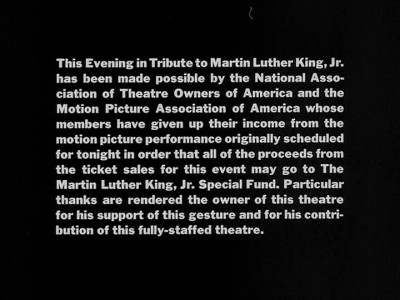
This is an interesting film to see on DVD since it was initially shown in theaters only once, in March 1970. It consists primarily of news footage shot of Dr. Martin Luther King Jr dating from 1955, when he began attracting significant media attention, through 1968 when he was assassinated. Interspersed throughout are short segments shot in a studio for this film release, of celebrities of the time (Harry Belafonte, Ruby Dee, Ben Gazzara, Charlton Heston, James Earl Jones, Burt Lancaster, Paul Newman, Anthony Quinn, Clarence Williams III, and Joanne Woodward) reciting quotations from other African-American writers which are not cited. Since its initial showing, it has since only been seen in edited form until this DVD release from Kino using a restoration by the Library of Congress.
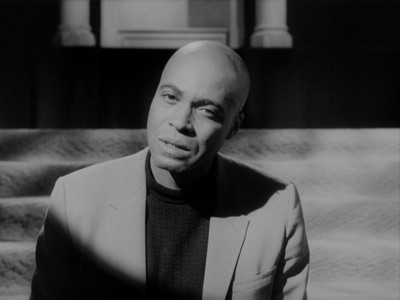
Aside from the studio segments, there is no narration or commentary on the footage shown, leaving the viewer to form their own reactions. The first event the film covers is the Montgomery, AL bus boycotts beginning in December 1955, when Black woman Rosa Parks was arrested for refusing to give up her seat for a White passenger as was required at the time. This prompted King, who already knew Parks and considered her "one of the finest citizens in Montgomery," to call for those in the community to stop riding the buses altogether to protest this policy. As he often did, he made an eloquent speech about the matter, of which only a distorted audio recording existed so it is presented here while the words are scrolled across a black screen. He states that "the great glory of American democracy is the right to protest for right," and asks his listeners to stand up for injustice but in a completely non-violent manner. Following this is footage what resulted- buses in the city driving down the streets with few passengers as groups of people walk or carpool. City officials are shown making statements.
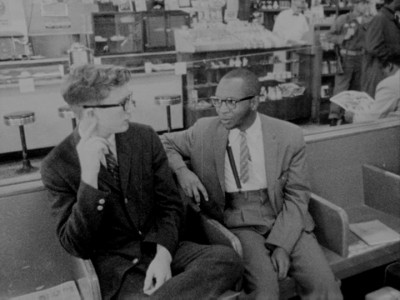
Other events are handled in the same manner, including protesting desegregation of other public facilities (through what became known as the "Freedom Rides") and the right to vote. Text occasionally appears onscreen identifying some of the events and people, but mostly it's left to the viewer to know what they are seeing. The effect is close to witnessing the events first-hand. Aside from one moment when a policeman is shown putting his hand over a camera's lens, those who shot the footage appeared to have made an effort to stay out of the way of whatever was happening and simply get it on film. What stood out for me was various signage and billboards in the background promoting a peaceful and ideal society while police are shown in the foreground using unnecessary force against some protestors and hateful words are shouted by racist citizens.
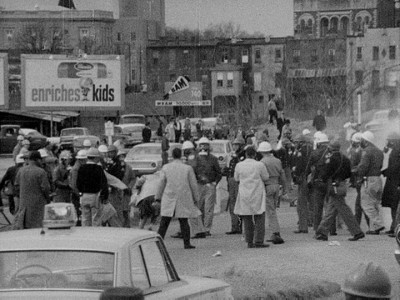
Martin Luther King was certainly an incredible communicator (and one would usually have to be in order to get any kind of attention during that time), making powerful statements about the injustices around him. I could fill this entire review with examples, but one that was especially to the point was "It is an unhappy truth that racism is a way of life for the vast majority of White Americans. I can see nothing more urgent than for America to work passionately and unrelentingly to get rid of the disease of racism." As we hear him saying this, numerous signage separating "White" and "Colored" persons in the city of Birmingham is shown. Soon after this, he is shown being arrested in the city and we then hear him reading his famous "Letter From a Birmingham Jail."
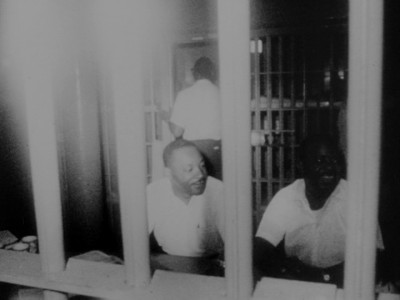
Other significant points include the March on Washington where King delivered his "I Have a Dream" speech, which is presented in its entirety, and a visit to Chicago marked with much hostility from racists in the area. The final segment chronicles his visit to Memphis in 1968, which resulted in his assassination.
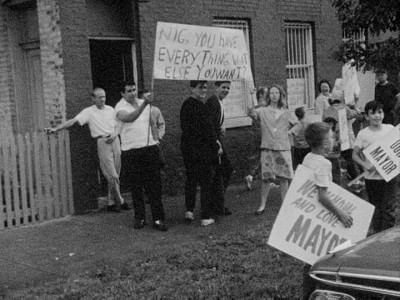
King: A Filmed Record is presented in 4x3, and all of it in black and white, even the studio segments. Most footage appears to have been shot on 16mm, which was the standard for TV news during that era, as well as some amateur 8mm film and kinescopes from live TV. The original film included a disclaimer that not everything was in perfect condition, but most of it looks good here given that. Most footage appears relatively clean with little to no damage, certainly better than the blocky picture quality from some of today's modern hand-held devices which will no doubt make their way into future documentaries.
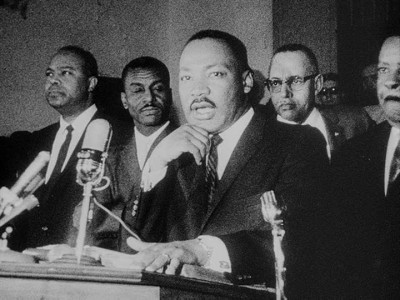
Audio is in Dolby Digital 2-channel mono. Most of it sounds clean, although some segments have a bit of background noise which was typical of technology at that time.
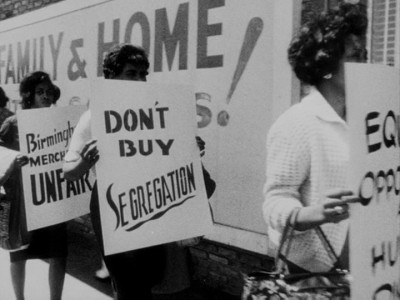
No extra material is included here. Although the film mostly speaks for itself, I would have liked to have seen some more footage that was not included in the final film, or at least any actual videotape sources that were converted to film here.
The only real criticism I have of this release is that it is on two single-sided, single-layer discs. Authored the way it is, it could have instead been on one 2-sided disc (I find flipping a disc preferable to taking one disc out of the player, putting it back in the case, then removing and playing the next) or better yet, have the entire program on one dual-layer side as it would have easily fit that way. This was meant to be shown with an intermission, which is where the first disc ends, but I'm always for formatting things requiring as little getting up as possible and have never been a fan of using multiple discs when they're not needed.
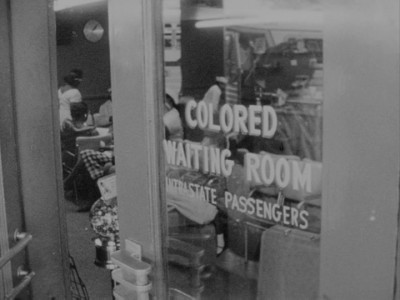
King: A Filmed Record should be required viewing for any history students or those following the Civil Rights Movement. As it was put together only a few years after the events actually occurred, it shows us what stood out to those who lived through them. For those who weren't yet born then, this film provides an invaluable record although other sources will need to be consulted in order to clarify things that are presented with no explanation. Being one who appreciates unfiltered documentation of history and believes that we can all learn from the past, I'm very proud to have this in my collection.
Jesse Skeen is a life-long obsessive media collector (with an unhealthy preoccupation with obsolete and failed formats) and former theater film projectionist. He enjoys watching movies and strives for presenting them perfectly, but lacks the talent to make his own.
|
| Popular Reviews |
| Sponsored Links |
|
|
| Sponsored Links |
|
|
| Release List | Reviews | Shop | Newsletter | Forum | DVD Giveaways | Blu-Ray | Advertise |
|
Copyright 2024 DVDTalk.com All Rights Reserved. Legal Info, Privacy Policy, Terms of Use,
Manage Preferences,
Your Privacy Choices | |||||||














